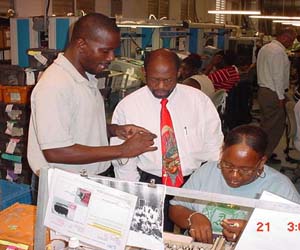|
|
|
|
|
|
|
|
|
 |
|
Kajola-Kristada's Shop Operation's Manager, Mr. Lyndon Delaney(l) shows St. Kitts and Nevis' Prime Minister Hon. Dr. Denzil L. Douglas (c) one of the connectors as Linda Francis continues her work. | BASSETERRE, ST. KITTS, JULY 11TH 2006 - The manufacturing sector in St. Kitts and Nevis although successfully holding its own in 2005, continues to be confronted by fierce competition from Asia and South America where wage rates and other production costs are much lower.
President of the St. Kitts and Nevis Chamber of Industry and Commerce, Mr.
Franklin Brand said the indigenous manufacturers are also facing an uphill battle from regional producers in the More Developed Countries (MDCs).
"The evidence is clear that our OECS manufacturers are especially disadvantaged by increased competitiveness and productivity; lower wage rates; significantly lower energy costs; and greater access to raw materials at low cost that are all enjoyed by Trinidad and Tobago manufacturers in particular," he told the 24th Annual St. Kitts and Nevis Private Sector Banquet.
According to Mr. Brand several manufacturing outfits are also eager to establish direct trade links with South America, where there are potential marketing advantages.
 |
| Kajola-Kristada's Gloria Archibald displays several of the connectors used by Cable TV users around the world. | He said that the private sector organisation has begun lobbying the Ministry of Industry and Commerce for a bilateral trade agreement between St. Kitts and Nevis and Brazil, in particular for market access of cable television traps.
"Inversely, some of our importers are also eager to trade in leather goods, cut flowers, canned foods, forest products and furniture that are produced in Brazil and Costa Rica," said Mr. Brand, who said that the Chamber intends to keep this dialogue open with Government, with a view to seeing a bilateral trade arrangement that results in "our consumers" access to cheaper, high quality products; and our manufacturers" access to a larger market other than our traditional ones in North America and Europe." |
|
|
|
|
|
|
|